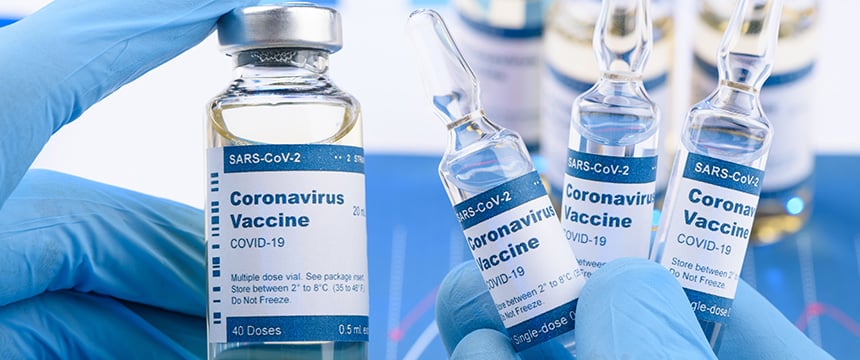EEOC Addresses COVID Vaccine Guidance and Potential Discrimination Issues

On December 16, 2020, the Equal Employment Opportunity Commission (EEOC) updated its Guidance on COVID-19 (COVID) in the form of additional FAQs. The EEOC has now answered the questions on many employer’s minds – whether employers can mandate employees to be vaccinated against COVID and what accommodations may be required under either a mandatory or voluntary vaccination program.
Importantly, the EEOC confirmed that mandating a COVID vaccination does not in itself, violate the Americans with Disabilities Act (ADA) because it is not a medical exam or inquiry. The agency cautioned, however, that pre-screening questions, posed before the vaccine is administered, may implicate the ADA’s provisions on disability-related inquiries. Therefore, such questions must be job related and consistent with business necessity. To meet this standard the EEOC stated that “an employer would need to have a reasonable belief, based on objective evidence, that an employee who does not answer the questions and, therefore, does not receive a vaccination, will pose a direct threat to the health or safety of her or himself or others.” Employers can avoid this issue by either (1) making the vaccine voluntary or (2) having employees obtain vaccinations administered by a third party that does not have a contract with the employer (i.e. pharmacies, health care providers, etc.). Moreover, the EEOC says that requiring proof of a COVID-19 vaccination is not a disability-related inquiry that violates the ADA.
If an employer decides to mandate the COVID-19 vaccine, the EEOC cautions that such employers will have to individually evaluate employee requests to opt out of the vaccine based on a disability and/or religious beliefs. This means that employers must train supervisors to identify such accommodation requests and how to respond to them, including elevating the request/inquiry to Human Resources, engaging in the interactive process, and seeking supporting documentation for the requested accommodation. The EEOC further advises employers to review and rely on both the CDC and OSHA and their respective recommendations and guidance when evaluating whether there is an effective accommodation that would not impose an undue hardship.
Specifically, the EEOC cautions that if an employee cannot be vaccinated due to a disability or sincerely held religious belief, then it would be lawful to exclude the employee from the workplace but not necessarily to terminate the employee. Employers will need to consider other options for accommodation – including telework, – and availability of protected or unprotected leaves of absence. For some jobs, telework may not be feasible, but there may still be other accommodations to consider, including requiring face shields, separation of work areas, maintaining social distancing indefinitely, etc.
Additionally, the EEOC stated that Title II of GINA is not implicated when requiring an employee to be vaccinated and/or provide proof of vaccination, so long as the employer is not collecting genetic information in connection with employee vaccinations. The EEOC refers employers to 29 CFR Section 1635.8(b)(1) for model language to use to warn the employee not to provide genetic information along with proof of vaccination (provided that no genetic information is transmitted with that proof). Specifically, the EEOC relies on the CDC explanation of the mRNA technology, which does not interact with DNA and therefore the vaccine alone does not implicate GINA. However, the EEOC’s guidance provides that pre-screening questions do implicate GINA if they involve the following inquiries:
- Information about an individual’s genetic tests;
- Information about the genetic tests of a family member;
- Information about the manifestation of disease or disorder in a family member (i.e., family medical history);
- Information about requests for, or receipt of, genetic services or the participation in clinical research that includes genetic services by the an individual or a family member of the individual; and
- Genetic information about a fetus carried by an individual or family member or of an embryo legally held by an individual or family member using assisted reproductive technology.
Although outside of the EEOC’s purview, unionized employers should recognize that requiring vaccinations will be a mandatory subject of bargaining and consider opening discussions with their unions. Exceptions could exist if the employer has discretion in implementing health-related work rules under a management rights clause. But, given that many Americans are currently suspicious of the vaccine, discussions with the union and providing employees with education about the vaccine will be a best practice. Employers should also recognize that for non-unionized employees who oppose a mandatory vaccine, union organizing may be an avenue through which they seek out such protection and engage in “protected concerted activity” protesting a mandatory policy.
In sum, the latest EEOC Guidance affirms that, with obligations to accommodate for disabilities and/or religious beliefs, employers may mandate their employees be vaccinated against COVID-19. Given that it will likely be several months before vaccines are widely available, employers do not need to make this decision today. Best practices at this time involve (i) educating the workforce on the vaccine and its safety and efficacy and (ii) evaluating incentives for voluntary vaccination programs for when the vaccine becomes available.
Finally, while the EEOC has jumped out of the starter’s gate with this early guidance, employers need to stay attuned to developments from state and local governmental agencies who may take an entirely different approach. This is relatively uncharted territory and depending what happens to the number of COVID infections and what we learn about the various vaccines will impact employers’ options. Therefore, legal counsel should be consulted with each step of the way.
Companies in all sectors of the economy continue to be impacted by COVID-19. Foley is here to help our clients effectively address the short- and long-term impacts on their business interests, operations, and objectives. Foley provides insights and strategies across multiple industries and disciplines to deliver timely perspectives on the wide range of legal and business challenges that companies face conducting business while dealing with the impact of the coronavirus. Click here to stay up to date and ahead of the curve with our key publications addressing today’s challenges and tomorrow’s opportunities. To receive this content directly in your inbox, click here and submit the form.


